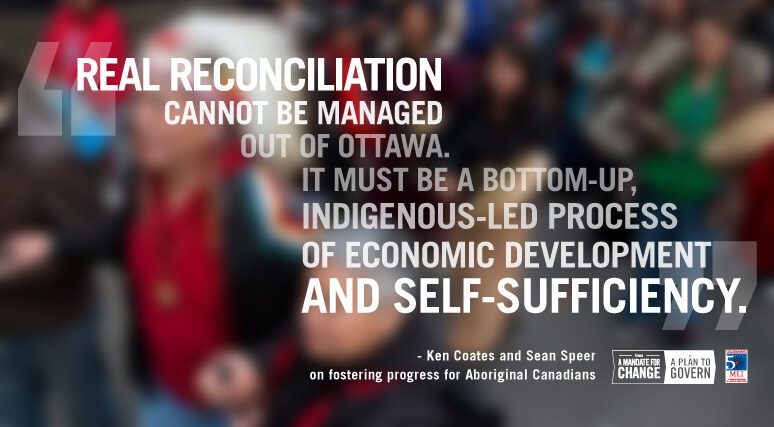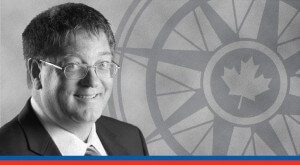
MLI Senior Fellows say the solution to fostering progress for Aboriginal Canada lies in less government – not more
OTTAWA, March 16, 2016 – The path to reconciliation for Aboriginal Canadians does not meander through the corridors of a government office in Ottawa.
If there is to be progress for Aboriginal Canada, it must be from a bottom-up, Indigenous-led process of economic development and self-sufficiency. Government has an enabling role to play but experience shows us that top-down, Ottawa-centric solutions are not the right path forward.
 That’s the message from Senior Fellows Ken Coates and Sean Speer who, in a new commentary for the Macdonald-Laurier Institute, forge a path forward for Indigenous communities – one that avoids the mistakes of the past.
That’s the message from Senior Fellows Ken Coates and Sean Speer who, in a new commentary for the Macdonald-Laurier Institute, forge a path forward for Indigenous communities – one that avoids the mistakes of the past.
Coates and Speer say the solution for ending the “national tragedy” of poor economic and social outcomes for Indigenous Canadians lies in less government, not more.
“It is more than a passing strange that those who seek to rectify serious historical challenges believe that more top-down, government solutions are the answer”, write Coates and Speer. “Real reconciliation cannot be managed out of Ottawa”.
To read the full commentary, titled “From A Mandate For Change To A Plan To Govern: Building a new Aboriginal opportunities agenda”, click here.
The authors believe Canada’s new government – which has promised to make Indigenous affairs a top priority – has an opportunity to reverse decades of failed government policy.
 Is there a place for government in fostering the conditions for Aboriginal prosperity?
Is there a place for government in fostering the conditions for Aboriginal prosperity?
Absolutely, say Coates and Speer – it just doesn’t have much to do with the inordinate amount of time Ottawa forces Indigenous communities to spend on applying for government grants and accounting for expenditures. It’s about setting the conditions for harnessing market forces and local autonomy to create real opportunities.
The authors offer several recommendations for improving the fortunes of Aboriginal Canadians:
- Ottawa should play an enabling role rather than a top-down one that sees Indigenous people as charity cases: Successive governments have ignored the failures of top-down welfarism and typically doubled-down on a policy framework that is marked by the absence of property rights, market mechanisms and local autonomy. We should be working together to remove the obstacles to Indigenous communities to pursue their own goals. For governments, this means exploring options for sharing government revenue from natural resource projects with Aboriginal communities (resource revenue sharing) and reforming the tax structure to allow First Nations to collect revenue directly. For development companies, it means partnering with Aboriginal communities to give them an equity position in natural resource projects.
- Work with indigenous communities to improve standards related to water quality, fire protection, housing, education, and health care: The woeful conditions in many communities should be unacceptable in a country as wealthy as Canada. Calls for an improved social safety net does not contradict a vision of local empowerment and self-sufficiency. As part of an opportunities agenda, there is a role for the state in ensuring that basic infrastructure and services are comparable to those available to non-Aboriginals. That should be the rock on which the rest of Aboriginal public policy is based.
- Focus on pre- and post-natal services and care for Indigenous families and their children: First Nations students often come out of traumatic home environments without adequate nutrition, sleep and personal support. Ottawa should work with local communities to strengthen community-based services and Indigenous families. “A helping neighbour is bound to have a more lasting impact than a bureaucrat in Ottawa”, write the authors.
This is the 13th paper in MLI’s series, From A Mandate For Change To A Plan To Govern.
The series, which is publishing weekly from the Throne Speech to the first budget this spring, is designed to offer practical policy recommendations that help the newly-elected government follow through on its election promises.
***
Ken Coates is a Senior Fellow with the Macdonald-Laurier Institute and Canada Research Chair in Regional Innovation in the Johnson-Shoyama Graduate School of Public Policy at the University of Saskatchewan.
Sean Speer is a Senior Fellow at the Macdonald-Laurier Institute. He previously served in different roles for the federal government including as senior economic adviser to the Prime Minister and director of policy to the Minister of Finance.
The Macdonald-Laurier Institute is the only non-partisan, independent national public policy think tank in Ottawa focusing on the full range of issues that fall under the jurisdiction of the federal government.
For more information, please contact Mark Brownlee, communications manager, at 613-482-8327 x105 or email at mark.brownlee@macdonaldlaurier.ca.




